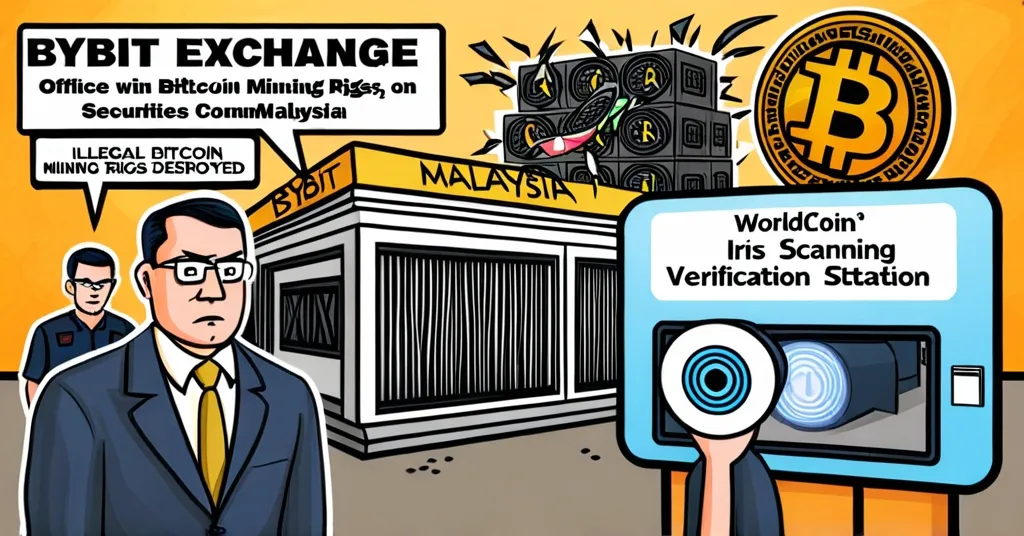Malaysia Orders Bybit to Halt Operations: Crackdown on Unregistered Crypto Exchanges

Malaysia’s Bold Move: Securities Commission Orders Bybit to Cease Operations
In a decisive action to protect investors and regulate the burgeoning cryptocurrency sector, Malaysia’s Securities Commission (SC) has ordered Bybit, a global cryptocurrency exchange, to shut down its operations within the country. The move comes as part of Malaysia’s ongoing efforts to clamp down on unregistered digital asset platforms and curb the illicit activities surrounding cryptocurrencies, such as illegal Bitcoin mining and fraud. At the same time, Malaysia is embracing innovative technologies like Worldcoin’s iris scan to advance its digital transformation goals.
- Bybit shut down in Malaysia due to lack of registration.
- SC warns of fraud and money laundering risks from unregistered entities.
- Malaysia battles illegal Bitcoin mining and crypto frauds.
- Country adopts Worldcoin’s iris scan tech for digital advancement.
The SC’s directive requires Bybit to disable its website and mobile applications and cease all promotional activities targeting Malaysian investors. Bybit, along with its CEO Ben Zhou, has been on the SC’s Investor Alert List since July 2021 for operating without proper authorization. The SC’s warning is clear: “The SC warned that investors dealing with unregistered entities are not protected under Malaysian securities laws and are vulnerable to risks such as fraud and money laundering.” Bybit has complied with these directives so far, but the SC remains vigilant in safeguarding investor interests.
Operating a digital asset exchange without registration as a “recognized market operator”—a platform officially approved by the government to facilitate trading—is a serious offense under Malaysia’s main financial regulation law, the Capital Markets and Services Act 2007. The SC emphasizes this point: “Operating a digital asset exchange without registration as a recognized market operator is a serious offence under Section 7(1) of Malaysia’s Capital Markets and Services Act 2007.” With no wiggle room, Bybit is left with no choice but to close shop in Malaysia, joining the ranks of other unregistered platforms that have faced similar fates.
Malaysia currently has only six registered cryptocurrency trading platforms: HATA Digital, Luno, SINEGY, MX Global, Tokenize Technology, and Torum International. These are the vetted options for Malaysian investors seeking safe entry into the crypto market.
Illegal Bitcoin Mining: A Drain on Malaysia’s Resources
The regulatory crackdown on Bybit is just one facet of Malaysia’s crypto conundrum. The country has been fighting a significant issue with illegal Bitcoin mining, which has caused an estimated $723 million in electricity theft between 2018 and 2023. Imagine running a secret factory that illegally taps into the power grid—that’s essentially what these miners are doing. In response, Malaysian authorities have taken drastic measures, destroying over $1.2 million worth of confiscated Bitcoin mining rigs. It’s not just about protecting the grid; it’s about sending a clear message to would-be miners that the law will catch up with them.
Cryptocurrency Fraud: A Growing Concern
Adding to the crypto chaos, Malaysia recently dismantled a forex investment fraud and cryptocurrency syndicate in May, further highlighting the dark alleys of the digital asset world. These cases underscore the SC’s determination to protect investors and maintain market integrity, but they also raise questions about how effectively Malaysia can manage the rapid growth and decentralized nature of cryptocurrencies.
Embracing Worldcoin: A Step Towards Digital Transformation
Amidst these challenges, Malaysia is also embracing innovation. The country has adopted Worldcoin’s iris scan technology—a method of identity verification using eye scans—to enhance digital credential verification. This move signifies Malaysia’s commitment to digital transformation, balancing regulatory oversight with technological advancement. Malaysia has even approved the public trading of Worldcoin tokens on recognized exchanges, indicating a willingness to explore new frontiers in digital identity verification.
Regulatory Framework: A Broader Context
Malaysia’s action against Bybit is part of a broader effort to regulate the cryptocurrency sector. The country’s regulatory approach is aimed at protecting investors and ensuring market integrity, aligning with global trends towards more stringent regulations. Recent legislative proposals in Malaysia have focused on enhancing the regulatory framework for digital assets, reflecting the government’s commitment to managing the growth of cryptocurrencies responsibly.
Counterpoints and Criticisms
While Malaysia’s regulatory measures are necessary for investor protection, they also raise concerns about stifling innovation or driving crypto businesses underground. Critics argue that overly stringent regulations could deter legitimate businesses from operating in Malaysia, potentially pushing them to less regulated jurisdictions. Furthermore, the adoption of Worldcoin’s technology, while promising, has faced scrutiny globally over privacy concerns related to biometric data collection.
It seems Malaysia’s regulators are saying, “No more free rides in the crypto wild west; you need a license to operate here!” This approach aims to bring order to a sector known for its volatility and unpredictability, but it must balance this with fostering innovation and growth.
Key Takeaways and Questions
- Why did the Securities Commission Malaysia order Bybit to shut down its operations?
Bybit was ordered to shut down because it was operating without the necessary registration as a recognized market operator in Malaysia.
- What risks do investors face when dealing with unregistered cryptocurrency entities in Malaysia?
Investors dealing with unregistered entities in Malaysia are not protected under securities laws and are vulnerable to risks such as fraud and money laundering.
- How has Malaysia been affected by illegal Bitcoin mining?
Malaysia has suffered significant economic losses, with an estimated $723 million worth of electricity stolen by illegal Bitcoin miners between 2018 and 2023.
- What action has Malaysia taken against illegal Bitcoin mining?
Malaysian authorities have destroyed over $1.2 million worth of confiscated Bitcoin mining rigs in response to illegal mining operations.
- What is Malaysia’s stance on Worldcoin’s iris scan technology?
Malaysia has officially adopted Worldcoin’s iris scan technology to enhance digital credential verification and has approved the public trading of Worldcoin tokens on recognized exchanges.
- Which cryptocurrency trading platforms are currently registered in Malaysia?
The registered platforms are HATA Digital, Luno, SINEGY, MX Global, Tokenize Technology, and Torum International.
- What broader implications does the regulatory action against Bybit have for the cryptocurrency industry in Malaysia?
The regulatory action underscores Malaysia’s efforts to tighten oversight of the cryptocurrency sector, potentially leading to more stringent regulations and increased compliance requirements for crypto businesses operating in the country.
- How does the adoption of Worldcoin’s technology fit into Malaysia’s digital transformation strategy?
The adoption of Worldcoin’s iris scan technology is part of Malaysia’s strategy to leverage advanced biometric systems for enhancing digital credential verification, aligning with broader digital transformation goals.



